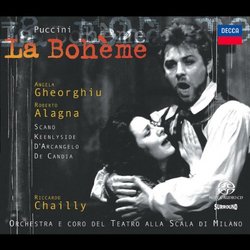Amazon.comGet ready to hear Puccini's star-crossed bohemians as you've never heard them before. To be sure, not only is La Bohème probably the most widely performed opera, but it's one of the most frequently recorded, from the superb account under Thomas Beecham to Karajan's famous Decca version (still a best seller after nearly 30 years). And it's precisely because of the opera's popularity that clichés and overromanticized distortions have settled around performance practice. Riccardo Chailly's goal in making yet another Bohème was to clear these away, using a new critical edition of the score and respecting Puccini's own stated views on how the music should sound, how the drama should unfold. The result is a profoundly moving work of restoration that deserves to join the ranks of its formidable predecessors. To begin with, this Bohème features a young cast--all in their 30s--of some of today's most characterful singers who together convey the necessary vital sense of ensemble. Angela Gheorghiu and Roberto Alagna (the couple first met performing the opera at Covent Garden) bring overwhelming chemistry to Mimì and Rodolfo. For once, we hear the arias of their famous encounter in Act I not as set pieces but as part of a larger momentum in which both are swept up. Alagna, with a thrillingly full sound to his top range, portrays a many-faceted Rodolfo, from dreamy poet and ardent lover to the man broken by loss, while Gheorghiu's radiantly sympathetic Mimì is a study in the use of subtle vocal coloring to dramatic effect. Elisabetta Scano sings an unusually light-voiced Musetta, as transparent as a boy soprano--a fascinating contrast to Simon Keenlyside's robust and charismatic Marcello. Chailly's urgent, unsentimental approach to the score is, quite simply, a revelation, and the story moves forward briskly. His insight into tempo relation between the "big" numbers and transitional sections highlights Puccini's effect of comic high spirits mingling with intense pathos. Whether it's the aching solo cello in "Mi chiamano Mimì" or the impeccable diminuendo of the final tragic bars, Chailly's well-known mastery of detail foregrounds a lucid variety of colors and dynamics from La Scala's orchestra--its first recording of the opera in more than 30 years--that are often neglected in the music. The result is categorically a Bohème for our time. --Thomas May

